Table of contents:
If you’re on the hunt for a new podcast editor, then you might have come across Reaper.
Reaper appears to cover all the bases when it comes to audio editing and it sits at a fair price point. But with their simplistic website, it can be difficult to gauge whether Reaper is well-suited to your specific podcast editing workflow or not.
In this article, we dive deep into everything you need to know about using Reaper. And we’ll also walk you through why Riverside is a strong alternative.
TL;DR
- Reaper is a desktop DAW that lets you record, edit, mix, and master audio
- You can use Reaper for free for up to 60 days. You then need to buy either a discounted or commercial license depending on how you’ll be using it.
- You can technically make limited edits to videos on Reaper
- Riverside offers the ability to remote record high-quality audio and video, an in-built intuitive editor, and automated transcription.
What is Reaper?
Reaper is an all-in-one digital audio production desktop app. Using Reaper, you can record, edit, process, mix, and master multi-track and MIDI audio. It’s a versatile tool that will cater to amateurs in their home studios to professionals at work. You can download Reaper on Windows, Mac, and Linux.
How much does Reaper cost?
There are two licenses for Reaper:
- Discounted License - $60
- Commercial license - $225
You can only use the discounted license if:
- You’re using Reaper as an individual for personal use
- You’re using Reaper commercially, but your annual gross revenue is not above $20,000 USD
- You are an educational or non-profit entity
You can also try Reaper for free for 60 days before purchasing a license.
Does Reaper offer video editing?
This is actually a bit of a trick question. The first thing you need to note is that Reaper is an audio editor. However, you can import video files and make limited edits to them. To do this, though, consider downloading a video encoder for improved video support.
Note that when you import your video file, it will appear just like an audio file on your Reaper interface. But any subsequent changes you make to the audio will impact the overall video file. You can open a video preview window too.
Reaper Video Editing Features
Let’s take a look at some of Reaper’s main features:
- It’s efficient and fast-loading meaning you can download it and run it using a portable or network drive.
- Easy to use with drag and drop editing
- Supports multichannel audio
- Import record and export to multiple media formats with customizable bit depth and sample rate
- Supports MIDI hardware and software, perfect for creators looking to create music too.
- Auto-stretch Timebase, which lets you stretch and manipulate audio around ‘complex tempo changes’
- Add plug-ins and modifications to make Reaper your own including customizable layout and ‘skins’
- Built-in effects that you can add to optimize and edit your audio.
Reaper Video Editing: The Basics
Let’s take a look at how to start using Reaper:
Setting up
Here’s a guide to getting set up with Reaper from scratch:
Step 1: Download Reaper
Step 2: Agree to the terms of the license
Step 3: If you’ve purchased a license, import your license key. If you’re using the free trial, click ‘Still Evaluating’.
Step 4: This is what your Reaper window will look like. From here, you can start recording your audio or importing your audio and video files. Just to be clear, it’s not possible to record video with Reaper, but you can edit pre-recorded video files.
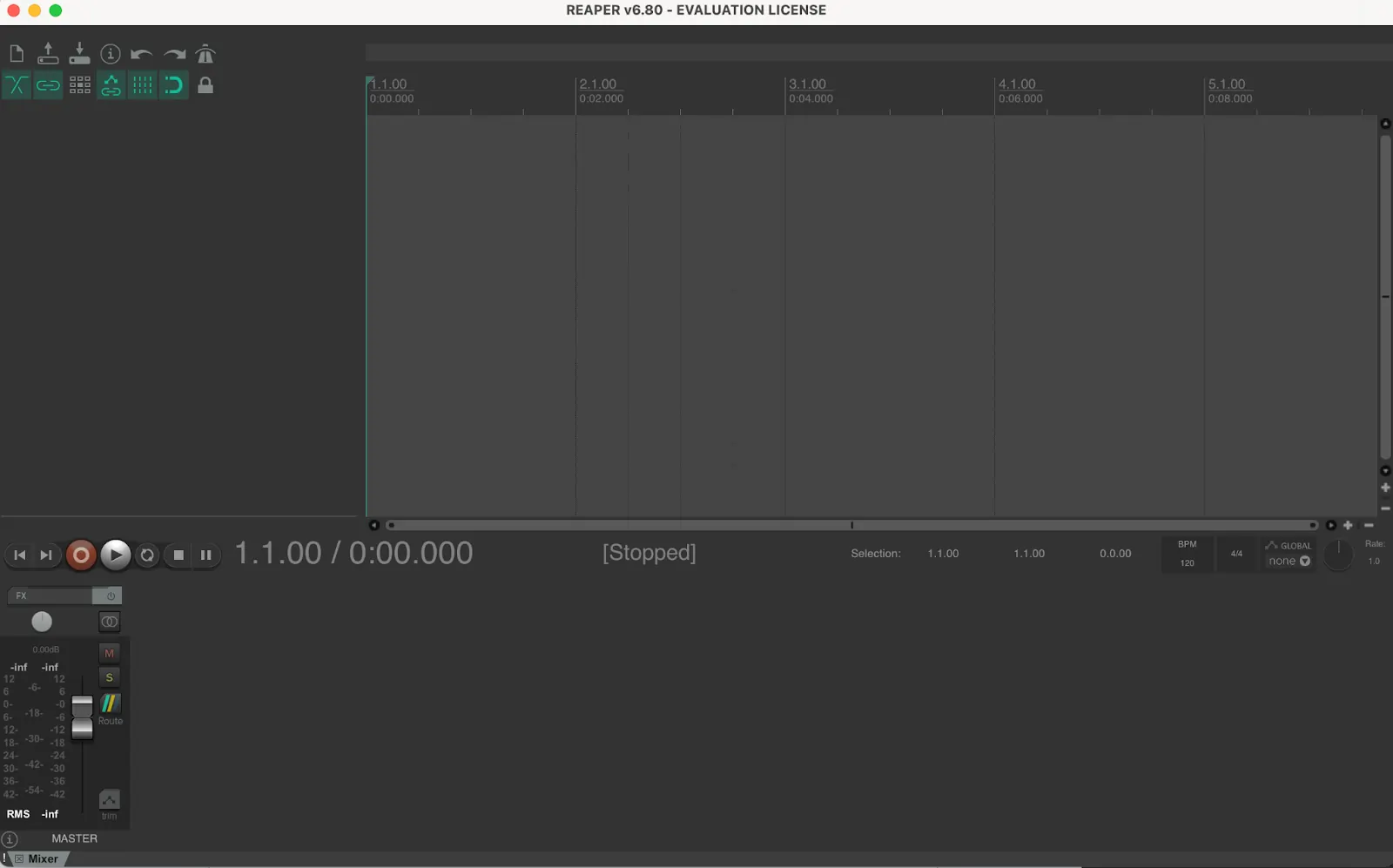
Recording with Reaper
If you want to start by recording audio, here’s what you need to do:
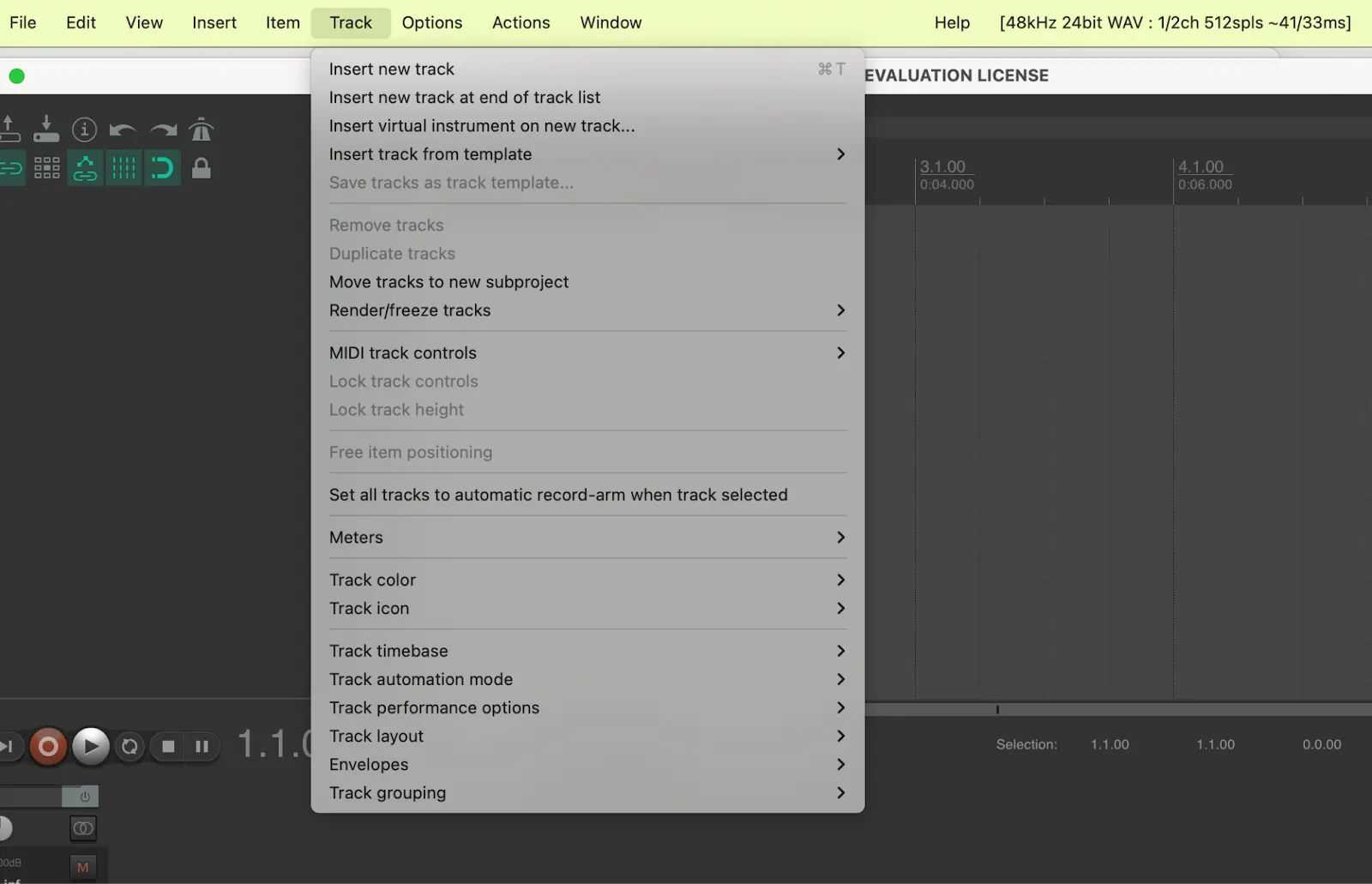
Step 1: Head to ‘Track’ then select ‘Insert New Track’
Step 2: You’ll see your new track added. Click the Red Record button on that track to ‘arm it for recording’.
Step 3: Hit the Record button to start recording that track. When you’ve finished recording, hit the Record button again.
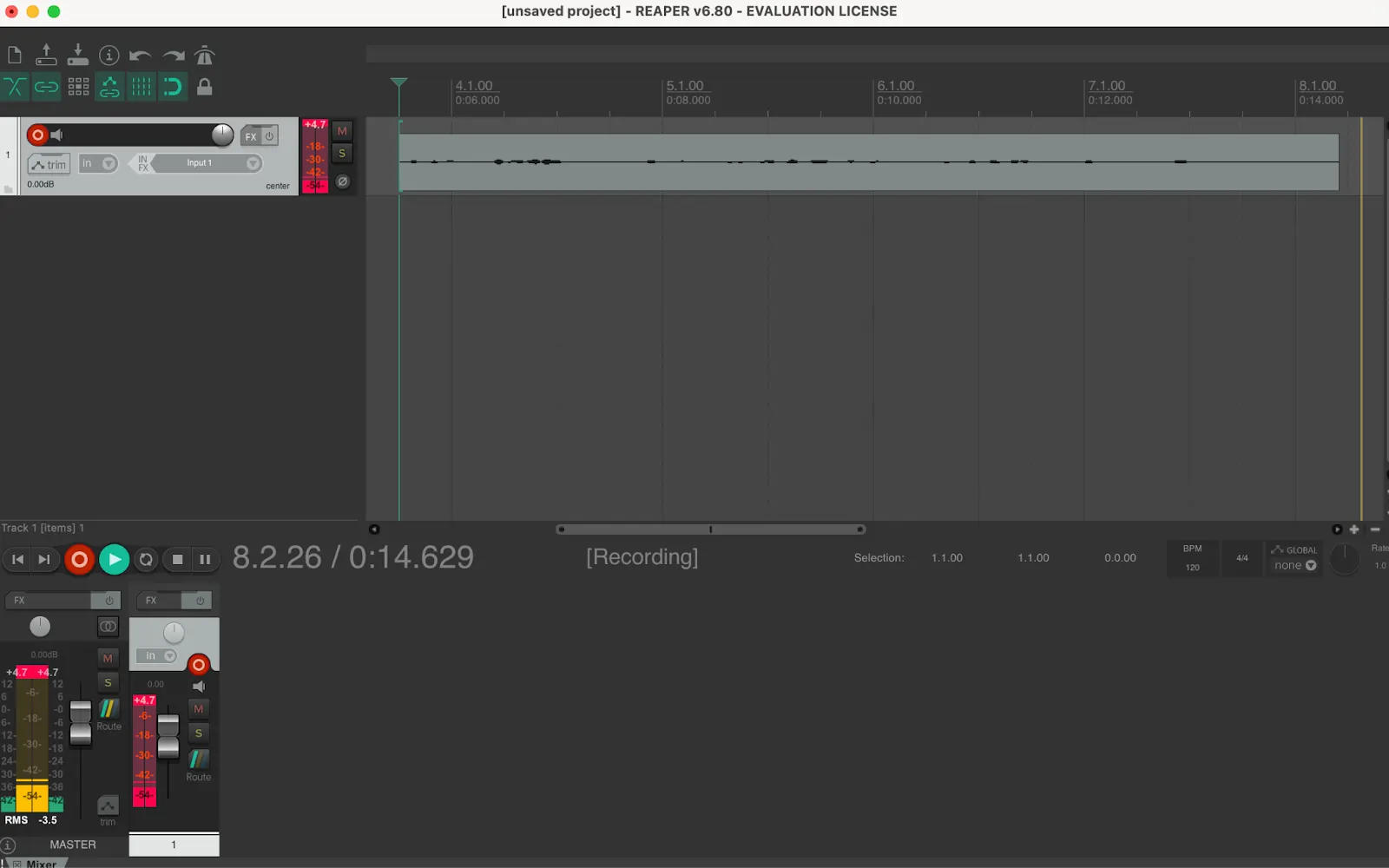
Editing
How to cut and split in Reaper
Move the playhead to the point where you want to split a track. Press ‘S’ on your keyboard to split the track.
To cut a track, simply click on it and press the backspace key.
How to trim a track in Reaper
Click on the point of the track to which you want to trim. Then click ‘Item’, and then ‘Trim items to the selected area’.
How to add effects (FX) in Reaper
To add FX to a track, click the ‘FX’ button and choose from the effects that are listed in the pop-up box.
Once you’ve selected the one you want, click ‘Add’
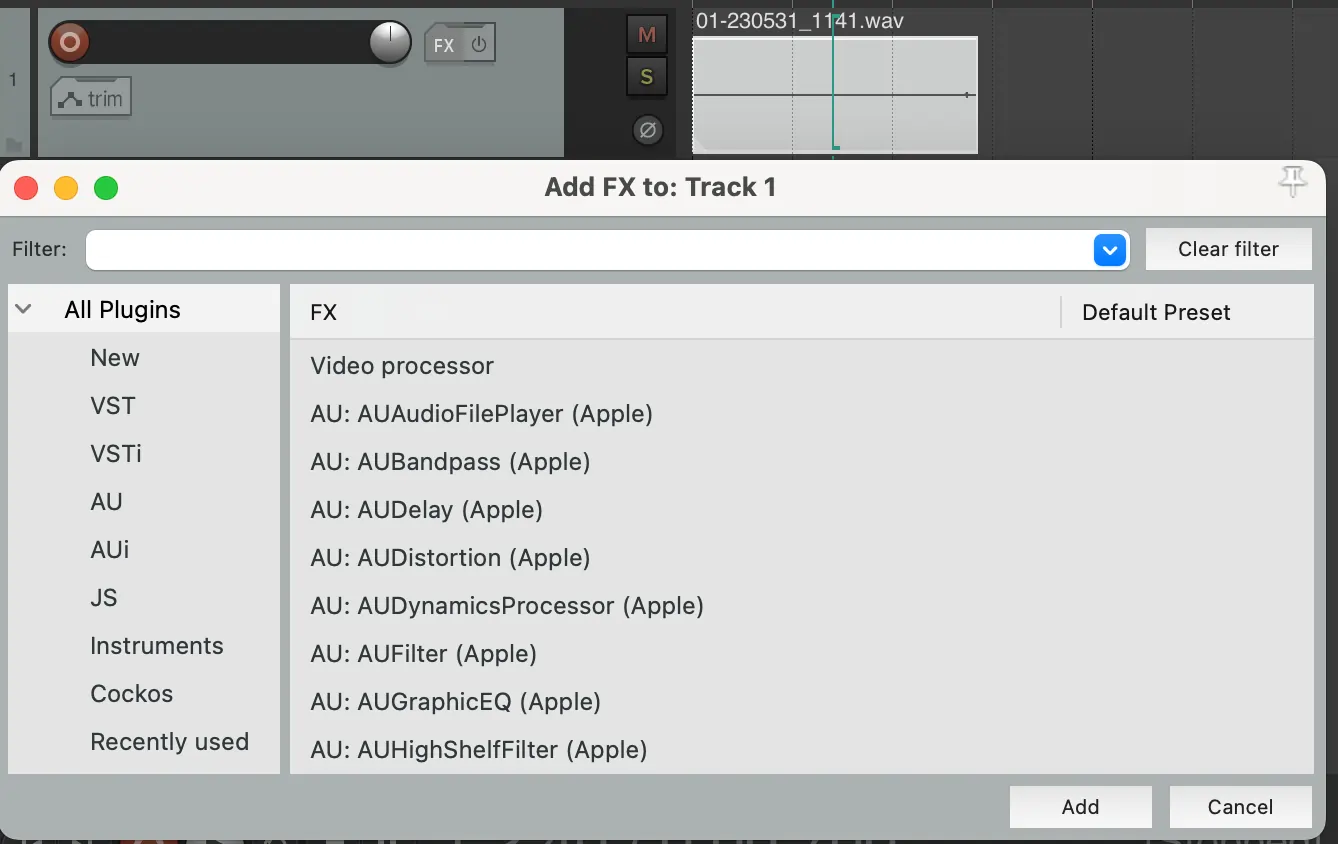
Importing
If you want to import a pre-existing recording, here’s how.
Either, simply drag and drop them into Reaper or head to Insert>Media File. Remember, if you want to add your file to a new track, you’ll need to create a new track first.
Reaper tips and tricks
To get the most out of Reaper, follow these tips:
Make use of Reaper’s resources
Reaper has a whole library of resources and videos dedicated to helping you understand the platform. Spend some time checking out their various tips.
Personalize Reaper
Reaper lets you personalize the platform to suit your workflow. Head to preferences and scroll through to see the different possibilities for personalization. You can tweak the colors and layout to accommodate your preferences better.
Set your own shortcuts
Press the question mark on your keyboard to open the Actions window. Here you can change shortcuts for certain actions to make your life easier. This should speed up your editing flow. The Actions window is a great place to find out Reaper’s capabilities.
Manage your CPU load
Audio editing can be resource intensive at the best of times. Reaper has a nifty tool called the ‘Performance Meter’ which lets you see what tasks/tracks are burdening your computer the most.
Is Reaper good for video editing?
Though it’s technically possible to edit a video on Reaper, we’d recommend opting for an alternative platform. Reaper isn’t geared towards video editing, so your workflow will likely be frustrating or subpar. It just isn’t worth it when there are several strong alternatives out there.
Read more: 10 Best Video Editing Software in 2024 (Every Level + Budget)
Is Reaper good for podcasting?
As an audio editor, Reaper is far better suited to podcasting. However, without the ability to remote record directly within the platform, it will only accommodate in-studio recording. Additionally, in terms of usability and the features on offer, some Reaper alternatives offer better options. For instance, some podcasters will definitely feel the absence of a transcription tool or social-media clips creator.
Reaper video editing alternatives
Depending on what kind of interface or features you’re looking for, Reaper might fall short of your expectations. If that’s the case, then you should definitely take a look at Riverside.
Riverside: Text-based video and audio editing
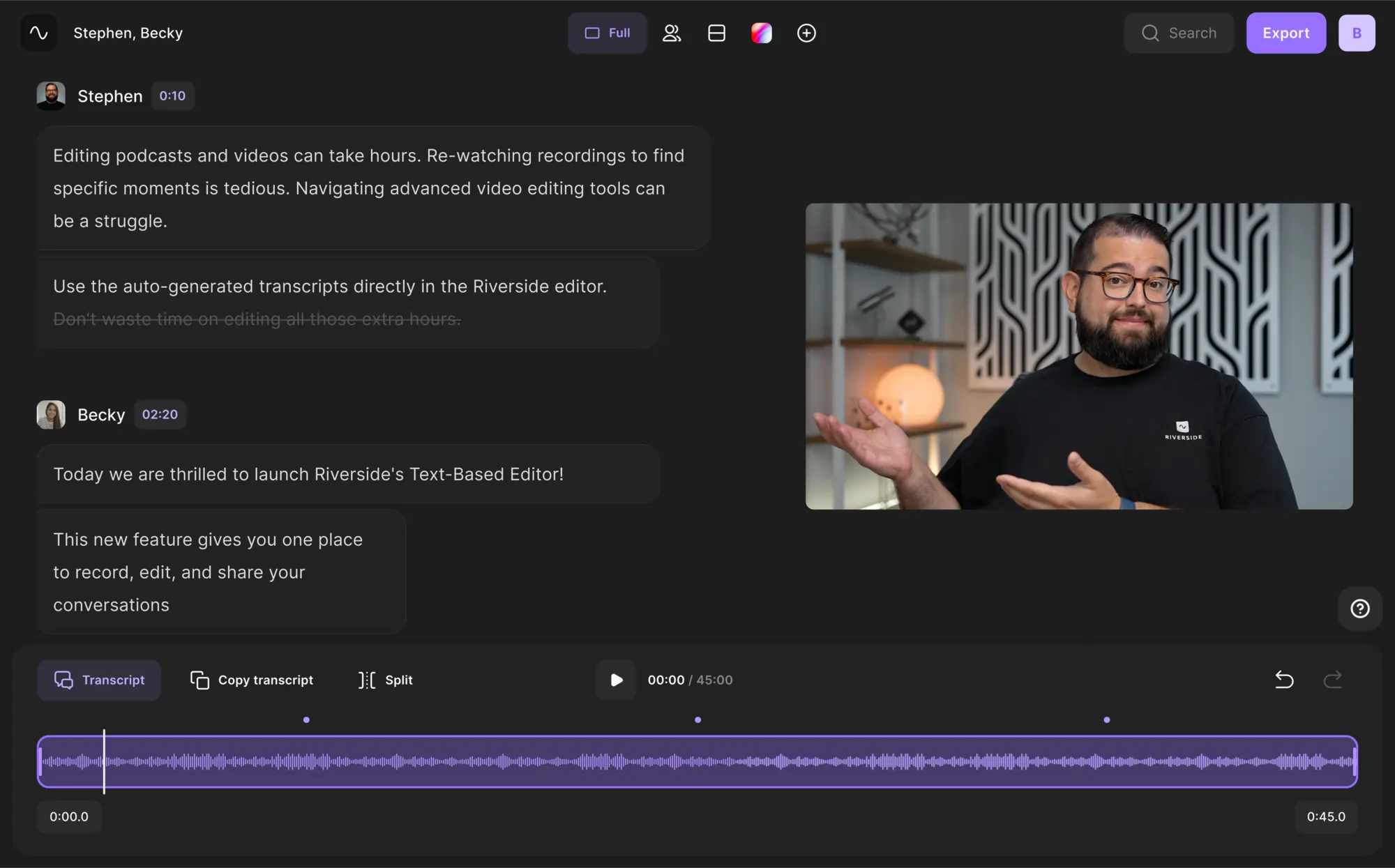
Riverside is a browser-based remote video creation software. While Riverside offers top-quality recording, you also get access to a powerful text-based editor which makes editing as easy as editing a Google doc. All you need to do is make changes directly to your video transcription and Riverside will reflect your edits in the video.
The editor works with Ai transcripts that are available in over 100 languages. These highly-accurate transcriptions are available straight after recording. You can burn captions into your videos, or you can download these transcriptions as TXT or SRT files.
And if you want to repurpose your video into short shareable social media videos, Riverside has an AI Magical Clips tool that does the work for you. Simply click the Magical Clips button after recording, and the Ai will turn your video’s key moments into shareable highlights.
On the recording end, you can expect up to 4K video resolution without worrying how strong your internet is. Riverside uses local recording, where each participant records their own device so the strength of your wifi doesn’t play into the overall quality of your recording. You can record with up to 10 participants and receive separate audio and video tracks for each.
Riverside’s interface is modern, sleek and easy-to-use. So there’s definitely no need to trawl a bunch of tutorial videos to get to grips with it.
Let’s take a look at some of Riverside’s key features:
- High-quality (remote) recording. You can record with up to 10 remote participants in the browser-based studio.
- Local recording means that Riverside records each participant on their own device rather than over the internet. This ensures that even weak wifi won’t negatively impact the overall quality of your recording.
- Multi-track recording so you receive a separate track for each participant. Any screenshares or other media will also have their own track.
- Media board which facilitates live editing during your recording session. Upload, play and record audio/video clips into your recording.
- Ability to livestream to all major platforms including Twitch, Facebook and YouTube.
- Automated AI transcription and captions. Ultra-accurate AI-powered transcription in over 100 languages. Export for use as captions or to turn into a blog.
- Effortlessly repurpose your video into short shareable social media highlights with our Ai Magical Clips tool
- Use your transcript to edit your recording using Riverside’s online video Editor. This makes editing your video or audio as easy as editing a Google Doc.
- Mobile app which means that you can also record on the go, wherever you are.
- Four pricing plans to cater to every budget.
Riverside vs Reaper
If you’re weighing up between Riverside and Reaper, we’d say the answer is pretty clear cut. Of course it depends on your needs.
Though Reaper is a solid choice with diverse features for video editing, Riverside offers a more streamlined, higher-quality and intuitive user experience. Riverside’s text-based editor changes the game when it comes to video (and audio) editing, speeding up and simplifying your workflow. Crucially, it gives you the ability to record video and audio in the same platform that you edit in, which Reaper doesn’t.
FAQs on Reaper Video Editing
How do I get my video to work on Reaper?
As we outlined above, you can simply import a media file into Reaper. But you might want to consider downloading a Reaper extension that makes it easier to handle video files.
Can I use Reaper for free?
Yes, you can use Reaper for up to 60 days before buying a license.
Why is Reaper better than Audacity?
This totally depends on your personal preference. You might find that you prefer one platform to the other. If you’re on a really tight budget, Audacity is the better option since it’s completely free and open source. However, if you want the ability to be able to edit video, then Reaper is the obvious choice.














.webp)
.webp)







